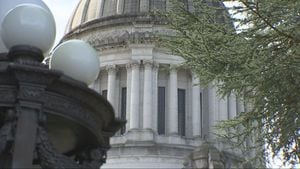With fewer than four weeks left in session, Governor Bob Ferguson is telling state lawmakers in the State House and State Senate that the budgets they recently passed are not good enough and they need to start again.
“Neither budget, however, is close to one that I can sign,” Ferguson said.
Ferguson said both budgets include too many tax increases, not enough cuts, and are too reliant on a proposed wealth tax, which he believes will be challenged in court, creating a timeline the state can’t afford to wait for as its budget woes increase. As part of its budget, Washington’s State Senate passed a bill that would tax $10 on every $1,000 of assets like stocks, bonds, and mutual funds that are worth over $50 million, generating an estimated $4 billion a year. Tuesday, the State House of Representatives passed a budget that includes an $8 per $1000 tax on those assets.
“If the Legislature wishes to complete our work on time, they need to immediately move the budget discussions in a significantly different direction on both of these issues,” Ferguson said in prepared remarks to reporters Tuesday.
Ferguson pointed to an increasing forecasted shortfall, from $15 billion in winter to $16 billion in March over the next four years, as a reason for lawmakers, especially those in his own party, to consider more prudent decision-making with Washingtonians’ tax money.
Ferguson laid out five ‘must-have’ items for any budget he will sign:
-
Protect the Budget Stabilization Account (Also known as reserves or a rainy-day fund)
-
Base Revenue on Realistic Growth Forecasts
-
Must find efficiencies and savings
-
Cannot rely on revenue that can be overturned in Court
He added that he’d prefer the Legislature include $100 million in grants for law enforcement agencies as well.
Ferguson believes a Wealth Tax would likely be challenged in court. It’s the latest attempt to even out the tax burden in Washington, a state that ranks second by tax policy organizations for disproportionately taxing more of lower and middle-income earners’ wages as opposed to wealthier Washingtonians.
“We do have a system that is not fair, that is too aggressive. That’s a fact,” Ferguson said, “So I’m open to ways that solve it, but we have to do it in a way that is thoughtful.”
Both the Senate and the House budgets included raising the cap on property taxes from one percent to inflation plus population increase, with a 3% limit, and considering a tax on payrolls for incomes higher earners ($176,100 in the Senate bill). Ferguson didn’t tip his hand on his stance on those items as he says negotiations continue. Ferguson did raise the spectre of preparing for large funding cuts from the federal government, pointing to an area like Medicaid, where billions of dollars come into the state, or the $2.5 billion in federal assistance to K-12 students.
Preparing for that situation is something Ferguson has highlighted to budget writers, including protecting reserves.
“We may not be able to prepare perfectly for what’s coming, but we can do a lot. “Ferguson said, ‘There are some big decisions coming in the next few weeks that will determine whether we are at the mercy of Donald Trump from a fiscal standpoint or do we have flexibility?”
The Washington legislative session is scheduled to end on April 27.
Read the full article here


